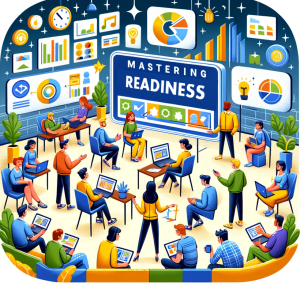Mastering Readiness for Effective Change with Our Expertise
At our organization, we specialize in understanding and enhancing the readiness of your team for successful project implementation. Recognizing that readiness is a dynamic, ever-evolving aspect is key to achieving impactful outcomes.
Why Focus on Readiness?
- Continuous Readiness: Readiness isn’t a one-time state. It’s an ongoing requirement as motivation and ability to adapt can fluctuate over time.
- Dynamic Nature of Readiness: Conditions impacting successful implementation can change, driven by both predictable and unpredictable factors.
- Innovation-Specific Readiness: Different projects demand varying levels of readiness. What works for one initiative may not suffice for another, even if they appear similar.
- Readiness Across Organizational Levels: Perceptions of readiness can vary between leadership and front-line staff, affecting planning and implementation.
Building and Sustaining Readiness
Our approach isn’t just to assess readiness but to actively build it. Understanding and managing change is complex, and our strategies are designed to match your team’s readiness levels.
Our Workshops:
- Understanding Readiness for Change: Gain foundational knowledge of readiness, its crucial role, and its evolving nature.
- Recognizing the Dynamic Nature of Readiness: Explore how readiness changes over time and the factors behind these shifts.
- Innovation-specific Readiness: Learn about readiness requirements for various types of changes.
- Readiness Across Organizational Levels: Understand readiness from different organizational perspectives.
- Navigating Disparities in Perceived Readiness: Strategies to bridge gaps in readiness perception across levels.
- Building Readiness for Change: Practical approaches to enhance team readiness.
- Change Facilitation: Skills for managers to guide their teams through changes, considering readiness levels.
- Maintaining Readiness Over Time: Sustain and foster readiness for long-term change.
Interested in empowering your team with these insights? Reach out to us for training tailored to your needs!

